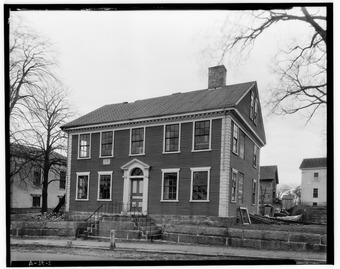Somerset Village Historic District facts for kids
Quick facts for kids |
|
|
Somerset Village Historic District
|
|

Pettis House
|
|
| Location | Avon St., Borland Ave., Cherry St., Church St., Clark St., Dublin St., High St., Main St., Maple St., Marsh St., Old Colony Ave., Palmer St., Peterson St., Pierce Ln., Pleasant St., School St., Simms Ave., and South St. Swansea, Massachusetts |
|---|---|
| Area | 110 acres (45 ha) |
| Architectural style | Italianate, Georgian, Federal |
| NRHP reference No. | 100005075 |
| Added to NRHP | March 13, 2020 |
The Somerset Village Historic District is a special area in Somerset, Massachusetts. It's like a time capsule that shows how the town center looked and grew over many years. This village was first settled a long time ago, in the 1600s. It became the main town center when Somerset officially became its own town in 1790.
The buildings in the district mostly show how the village grew in the 1800s. You can see many different styles of architecture. This historic district was added to the National Register of Historic Places in 2020. This means it's recognized as an important place in history.
Contents
Exploring Somerset Village
Somerset Village is located on the west side of the Taunton River. This river flows through the northern part of Somerset. The main roads here are Main Street, which runs along the river, and High Street, which is a bit further west on a small hill. Many smaller streets connect these two main roads.
What the Buildings Look Like
Most of the village is made up of homes. The styles of these buildings range from very old Georgian homes, built in the early 1700s, to Italianate homes from the mid-1800s. The oldest building dates back to about 1723.
There are also important public buildings. These include the Baptist Church, built in 1804, and St. Patrick's Catholic Church, built in 1873. The Baptist Church is a great example of Greek Revival style. St. Patrick's Catholic Church shows the Romanesque Revival style. You can also find buildings that were once part of the village's shipyards. These are located at both ends of the village.
How the Village Grew
English settlers first came to this area in the 1670s. They bought the land from Native Americans. At first, this village was part of Swansea. It was known as Bowers Shore. This name came from Jonathan Bowers, who started the first shipyard here in 1705.
Early Industries and Life
Somerset Village became a busy port. Ships would bring in goods from other countries. It was also a center for whaling for a while, until the mid-1700s. Shipbuilding remained a very important business. Many people in the village worked as shipbuilders or were ship captains.
Changes Over Time
In 1875, a big fire caused a lot of damage to the northern part of the village. The shipyards eventually closed down in the early 1900s. After that, Somerset Village became more of a quiet place where people lived and commuted to other towns for work.



